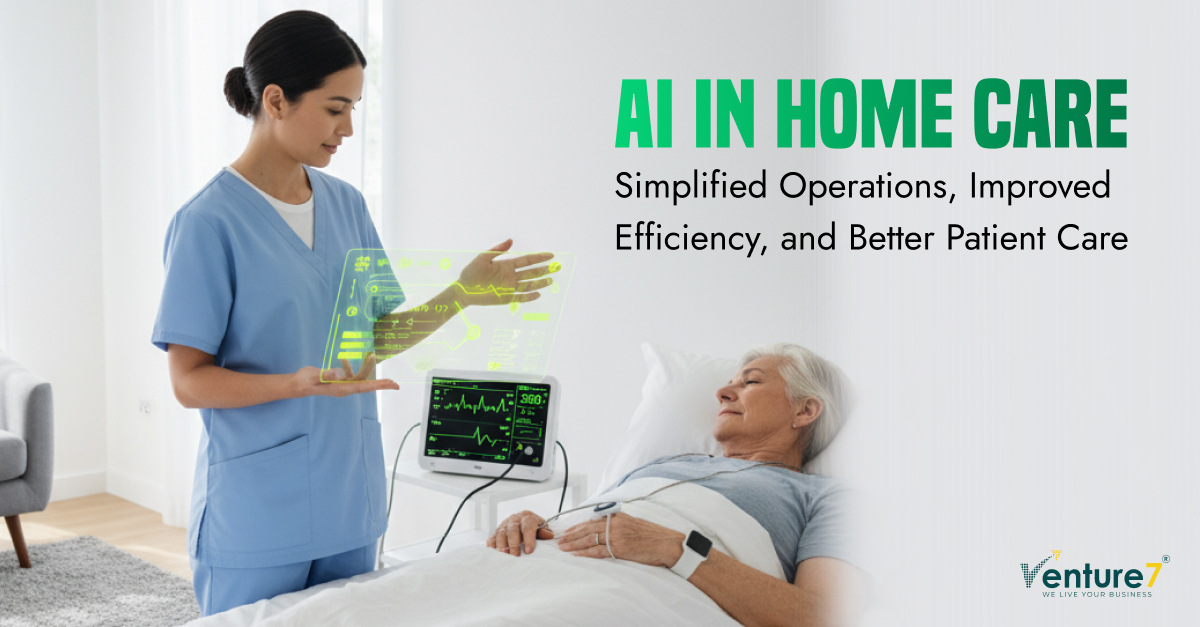The U.S. home healthcare sector is at an inflection point. As the aging population grows and the demand for personalized, in-home medical care surges, agencies are struggling to manage staffing shortages, complex scheduling, regulatory compliance, and rising costs.
Artificial Intelligence (AI) and automation are reshaping this landscape—turning manual, time-consuming processes into intelligent, efficient, and data-driven workflows.
From optimizing caregiver scheduling to predicting patient needs, AI is not just transforming home care operations—it’s redefining what quality care means. For healthcare leaders, now is the time to explore how AI can deliver scalable impact across business and clinical outcomes.
What is AI in Home Care?
AI in home care refers to the application of technologies like machine learning (ML), natural language processing (NLP), computer vision, and generative AI to streamline workflows, improve care coordination, and enhance patient experiences.
Automation, on the other hand, replaces repetitive manual tasks—like appointment scheduling, documentation, or billing—with intelligent systems that run autonomously or semi-autonomously.
In simple terms:
AI helps decide what needs to be done.
Automation does it—accurately and consistently.
These technologies combine to build AI-powered home care ecosystems, where data drives real-time decision-making, predictive insights, and personalized care delivery.
Why Home Care Needs AI Now More Than Ever
- Aging U.S. population: By 2030, 1 in 5 Americans will be over 65.
- Caregiver shortages: The U.S. is expected to face a deficit of over 150,000 home health aides by 2030.
- Rising administrative load: Over 25% of caregiver time is consumed by paperwork and manual coordination.
- Shift toward home-based care: The Centers for Medicare & Medicaid Services (CMS) projects a 7% annual increase in home health spending through 2032.
AI presents the only scalable solution to meet this growing demand—enhancing efficiency while maintaining human-centered care.
Manual vs Automated Home Care
| Aspect | Manual Process | AI-Driven Automation |
|---|---|---|
| Scheduling | Manually assigning caregivers, prone to conflicts | Intelligent routing based on location, availability, and skill |
| Billing | Manual data entry, errors in documentation | Automated EHR sync and real-time invoicing |
| Care Documentation | Time-consuming note-taking | Voice-to-text or AI-generated care summaries |
| Patient Monitoring | Reactive—caregiver reports only | Predictive—IoT + AI detect anomalies early |
| Compliance | Manual audits and record-keeping | AI alerts for missing documentation or EVV validation |
Result: AI reduces human errors, cuts costs, and allows caregivers to focus on what truly matters—caring for patients.
Top 5 Challenges for Home Healthcare Agencies
Even as home healthcare grows, agencies face persistent operational and business challenges:
- Scheduling inefficiencies – Coordinating large caregiver networks with changing patient needs.
- High administrative costs – Manual documentation, billing, and compliance checks.
- Staffing shortages – Retaining skilled caregivers amidst burnout and workload pressure.
- Data fragmentation – Disconnected systems hinder patient insights and care continuity.
- Compliance complexity – Ever-evolving state and federal regulations require constant monitoring.
AI addresses each of these head-on through automation, predictive insights, and smart integrations.
Application of AI in Home Care Process
AI and automation impact nearly every step of the home care process—from patient intake to caregiver evaluation.
1. Smart Scheduling and Route Optimization
AI analyzes real-time traffic, caregiver proximity, skill set, and patient acuity to create optimal schedules—reducing travel time and ensuring better coverage.
2. Virtual Care and Telehealth Enablement
AI-powered video consultations, chatbots, and predictive health models ensure patients receive timely assistance—especially for chronic or post-surgery monitoring.
3. Predictive Health Monitoring
Integrating IoT sensors and wearable data, AI models detect anomalies such as heart rate spikes or unusual activity patterns—alerting caregivers before a crisis occurs.
4. Automated Documentation
Using NLP and speech recognition, caregivers can dictate notes or rely on AI-generated care reports—reducing paperwork time by up to 60%.
5. Fraud Detection and Compliance Automation
AI validates visit times through Electronic Visit Verification (EVV), flags discrepancies, and ensures billing integrity—saving thousands in potential penalties.
6. Caregiver Performance Analytics
AI dashboards provide real-time KPIs, tracking caregiver efficiency, punctuality, and satisfaction levels for continuous improvement.
Impact of AI and Automation in Home Care
The true value of AI lies in measurable impact—both operationally and clinically.
1. Operational Efficiency
- Up to 40% reduction in administrative overhead
- Faster patient onboarding with automated data intake
- Streamlined billing and faster reimbursements
2. Improved Patient Care
- Real-time monitoring ensures proactive intervention
- Personalized care plans using AI insights
- Enhanced satisfaction for both patients and families
3. Data-Driven Decision Making
- Unified dashboards aggregate data from multiple systems (EHRs, CRM, EVV, IoT)
- Executives gain actionable insights into resource allocation and cost optimization
4. Cost Savings and ROI
McKinsey reports that healthcare providers using AI and automation see 20–30% cost reductions while improving care quality—proving AI is not just a tech upgrade, but a business growth enabler.
Tasks Automated to Save Time and Effort in Home Care
| Automation Task | AI Application | Impact |
|---|---|---|
| Appointment scheduling | Predictive workload balancing | 30% fewer cancellations |
| Billing & payroll | AI-powered validation | 25% faster processing |
| EVV compliance | Geo-verification + NLP audit | Error-free documentation |
| Care documentation | Generative AI summaries | Saves 2+ hours daily |
| Communication | AI chatbots for patients/families | 24/7 engagement |
| Recruitment | AI candidate scoring | 40% faster hiring cycle |
Future of Home Healthcare – Trends & Predictions
- AI Agents for Home Care
Autonomous AI agents will handle repetitive queries, onboarding, and care coordination using conversational AI. - Predictive Care Ecosystems
Integration of AI, IoT, and EHR systems will enable real-time health predictions—preventing hospital readmissions. - AI-Powered Workforce Management
Platforms like Venture7 AI Cloud will forecast demand and auto-adjust staffing levels. - Voice and Vision AI
Caregivers will use smart glasses and voice assistants for documentation and real-time patient support. - Generative AI in Patient Engagement
LLMs like ChatGPT and Perplexity will personalize educational content, reminders, and follow-up communications based on patient profiles.
How to Start with AI and Automation in Home Care Operations
Transitioning to AI doesn’t require a full system overhaul. Start with a step-by-step adoption plan:
Step 1: Assess Current Workflow
Map repetitive, error-prone, or time-consuming processes—these are your automation targets.
Step 2: Choose the Right AI Partner
Select a partner experienced in healthcare AI, data security, and compliance (HIPAA, HL7, FHIR).
Step 3: Pilot and Measure
Begin with one department (e.g., scheduling or billing), then measure impact before scaling.
Step 4: Integrate and Scale
Gradually expand AI integration into patient monitoring, communication, and analytics.
Step 5: Upskill the Workforce
Empower caregivers and admins with AI literacy to ensure smooth adoption.
Venture7® AI and Automation in Home Care
At Venture7®, we help home care agencies across the U.S. build scalable, AI-driven operations through our AI and Automation Cloud Platform.
Our solution combines:
- AI Agents & Predictive Analytics for real-time insights
- RPA (Robotic Process Automation) to eliminate manual tasks
- Generative AI for documentation, scheduling, and patient communication
- HIPAA-compliant integrations with EHR, CRM, and EVV systems
Key Outcomes for Agencies
40% faster caregiver scheduling
35% cost reduction in admin operations
2x improvement in patient satisfaction
Seamless compliance management
Whether you’re looking to automate workflows, improve caregiver efficiency, or deliver better patient outcomes, Venture7® helps you adopt AI without complexity.
Conclusion
AI and automation are no longer optional for home healthcare—they’re the foundation of sustainable growth and quality care delivery.
The question isn’t whether to adopt AI—it’s how fast you can leverage it to stay competitive. By embracing intelligent automation now, your agency can simplify operations, empower caregivers, and deliver the personalized, proactive care every patient deserves.
Venture7® stands ready to help you make that transformation—turning your data into decisions and your workflows into smart, scalable systems.
Frequently Asked Questions (FAQs)
How is AI used in home healthcare today?
AI is used for caregiver scheduling, predictive health monitoring, automated documentation, and patient communication through AI chatbots and virtual assistants.
Is AI safe and compliant for healthcare use?
Yes. When implemented within HIPAA and FHIR standards, AI ensures data privacy, compliance, and traceability across care workflows.
How does AI improve caregiver efficiency?
AI automates administrative tasks, optimizes travel routes, and provides real-time insights—allowing caregivers to spend more time with patients.
What ROI can home healthcare agencies expect from AI adoption?
Most agencies report 20–35% cost savings within the first year due to reduced manual labor and improved operational efficiency.
5. Can small and mid-sized home care agencies afford AI solutions?
Absolutely. Modern AI platforms like Venture7® offer modular, pay-as-you-scale models suitable for agencies of all sizes.





